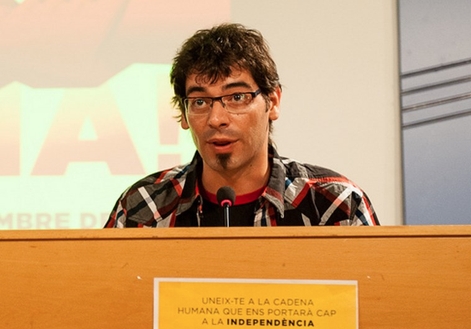15.03.2014 - 11:05
The Catalan National Assembly has chosen April 23, 2015 for Catalonia’s Declaration of Independence, whether a referendum has been held or not. The 2014-2015 road map, developed by a commission that was nominated by the Secretariat of the group will have to be approved in the General Assembly on April 5 in Tarragona. One of the members of the Secretariat, Ignasi Termes, talks to VilaWeb about civil disobedience, the effect the declaration of independence will have, and responds to the threats of the newspaper ABC, which recently demanded in an editorial that the state arrest the leaders of the ANC.
Why April 23, 2015?
April 23 is a symbolic day—[The Day of Sant Jordi, or Saint George, who is Catalonia’s patron saint; one of the country’s most popular holidays is celebrated by giving books and roses to loved ones]—but it’s more a general target, a calendar, not an exact date. In this case, they’re not proposing a road map with one sole route, but rather they have made a plan that aims to analyze various scenarios. We put what we think is the best case, that is, the objective that the referendum can be held completely normally. The big news is this, that the road maps have one direction and that that direction changes depending on the events that don’t depend on us, that we can’t control but that we have to keep in mind.
But this target date of Sant Jordi Day next year is maintained whether or not the referendum can be held. It’s a way of setting a deadline even for the plebescite vote.
Yes, that’s the idea. No matter what the scenario, the process cannot drag on indefinitely. The alternative actions in other scenarios have to stick to the calendar.
Scotland has set two years between its referendum and its declaration of independence. Why in our case have you only allowed for a little less than one year?
Here there isn’t the same will as the British Government has in order to establish a period of negotiation, which, if it existed, would allow for a more relaxed schedule. In this case, we know that the Spanish Government is not open to negotiation and that in any case, we have to take the initiative and be able to negotiate on an equal footing after having already declared independence. It’s clear that before that happens, negotiation is impossible.
[PP leader] Sánchez-Camacho has accused you of wanting to block and control harbors and airports.
That is twisting the truth. In the ANC we don’t have any intention of controlling those infastructures ourselves. It is the country that will have to take control. Those are indispensable structures for keeping the country functioning, that cannot be allowed to stop working. We believe that the Catalan institutions must take charge from day one so that they keep functioning without any trouble. These infrastructures that currently depend on the Spanish state will have to be controlled. In a situation with a declaration of independence, they are the first infrastructures that will have to be quickly controlled so that they don’t stop working.
When you speak of acts of sovereignty, you mean it will be necessary to commit acts of disobedience.
When we speak of acts of sovereignty, we mean that we need to begin to think like a state and to act like one, that we need to undertake actions from this point of view, that there is a legitimacy that overrules Spanish legislation, that completely disregards the existence of a Catalan state. And it will have to be overruled with this declaration, that will turn the Catalan people in a new direction.
The Madrid daily, ABC, wrote in a recent editorial that the State should dissolve the ANC and that it should arrest all of you.
That goes along with the Spanish state’s position, which instead of trying to understand the Catalan situation, threatens and destroys any kind of bridges, in this case with direct threats to a group that hasn’t done absolutely anything illegal and I’d like to see how they would take such an action. It’s a threat that coincides with the hubris that the Spanish State has exhibited throughout this process, because I think that they have the state power, but they have not paid attention at any moment to the fact that this process has the strength of the civil society behind it which is going in this direction. Threats of any sort are completely out of place.
Are you afraid that it might happen?
We should anticipate that it is a possibility, yes. We don’t understand how they could do such a thing, because there is no legal argument that they could use for such an action. But at the very least, we should be prepared.
What will the ANC do this September 11th? [The Diada, Catalonia’s National Day]
We will decide on April 5. For months, the ANC has fielded suggestions and ideas from all over about what we could do this year. All of the actions that we carry out are not the idea of one person with an inspiration, but rather the sum of a variety of ideas. Since there was a lot of interest in thinking about what we could do to outdo last year’s Catalan Way, we have received many, many proposals—more than 200—of all kinds. Now we will share them with the whole Secretariat and we will look at the advantages of each of these ideas.
You say that this Diada (September 11) will be remembered as the one that made the referendum possible.
This year we have a very important day, which is November 9th, but we won’t get there if we’re not prepared, and thus, this September 11th is very important.






